FEATURE
Playgirl magazine
mid: being the part in the middle or midst; occupying a middle position
When affixed to the word “life,” this benign prefix takes on crisis connotations, while somehow simultaneously conveying boredom. Midlife lacks the seduction of youth and acumen of old age. It is not here, nor there. Photographer Elinor Carucci’s monograph Midlife upends these interpretations. Neither mundane nor catastrophic, it is an arresting documentary of a universal life stage defined by aging parents, greying hair, growing children, and the conflicting emotions they precipitate. It is also a record of the period’s rewards: an amplified enjoyment of life, stronger connections to family, and feelings of personal liberation and acceptance.
Carucci’s journey to this enlightened place is charted by her greater oeuvre. Her first book, Closer, reveals a young woman reflected in her parents and partner. In her next, Mother, the barometer becomes her burgeoning belly, then babies. Midlife, instead, turns the audit inward, examining vestiges of past identities—lustrous locks turned grey, taut muscles turned slack, passion turned into partnership, toddlers turned teenagers, a uterus removed—to decipher what remains once external qualifiers fall away.
By placing her body at the center of the work, Carucci challenges the notion that middle-aged women are invisible. By commemorating the phase’s common symbols, she rebels against the dismissal of middle age as a transition. In midlife, her images suggest, we become the axis around which younger and older generations orbit, the core that binds the poles together—the middle.
The middle of anything, unscrutinized, is forgettable. Examined, Carucci hypothesizes, it becomes a bellwether: the legacy of our life to date and an astute map for navigating the future.
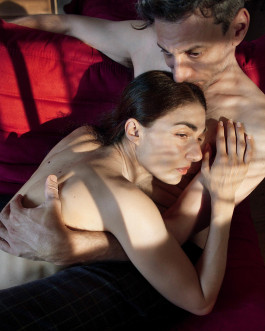
ERAN & I
We tend to think that what women go through in midlife is more difficult, and it is more difficult to be a middle-aged woman. It is more challenging in some ways, definitely professionally, and appearance is—generally speaking—more important for women. There is also something about the loss of fertility, which is not something men go through. In my case it was a hysterectomy, so it was more extreme, but the loss of fertility irrelevant of age is difficult, not because you want to have another child but because of how you define and see yourself. But, then, I’m talking to my friends who are guys and they have their challenges as well, so I don’t know who has it harder. I’m not trying to sugarcoat it, but we should be helping one another. If women can make as much money as men, it can help the men and it can help the marriage and it can help the family.
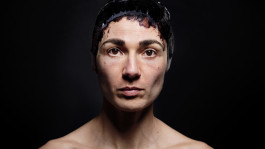
HAIR DYE
My decision to stop dyeing my hair was my reaction to the Me Too movement. When it started, there was something about it that made me think, "Fuck this: My hair is grey and I don't want to keep hiding it." I hate hiding things. I hate secrets. I think they burden us. This is part of the reason I make the work that I make. There is something very liberating in not having secrets, in sharing your flaws, your weaknesses, and your bad times. And I was feeling like I was hiding my grey hair all the time. There was something in the constant process of dyeing the hair and seeing the roots grow that was driving me crazy. If I could have my 25-year-old hair back, I would do it, but I can't. It was liberating, but it was scary. My son was really disturbed by it, realizing it was there the whole time. I had to deal with the way people around me--from the closest people to the professional world--reacted. There is a reaction. It affects the way people see you. It's a little thing, but it affects your life. It makes you think. It makes you lose some old tribes, but maybe find a new one.
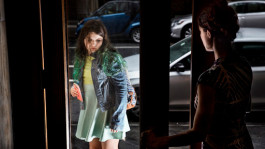
LEAVING
My definition of feminism changes by the day, but I think it's the appreciation of the opportunities and qualities of women. Men and women are similar, but they are not the same. I had a big fight with my daughter a few days ago when I said, generally speaking, on average, women are not as physically strong as men. Physically. Not in terms of what their bodies can do or endure. She was so upset. She called me conservative. It got out of control. Then we saw Michelle Wolf's last stand-up comedy act and this was one of the things she was talking about, and I was like see: She is a feminist saying that we don't have to be the same in order to be appreciated for who we are. I think this is what feminism is to me. It's not seeing men as superior or women as superior. I don't think women are smarter. I don't think they are more sensitive. I don't think men are more capable professionally, or even in the battlefield. I just think that they are in some ways different and in some ways not--and we should be respected, appreciated, and compensated for our qualities. I guess this is feminism. It is so crucial to define feminism, but it is also crucial that it doesn't become man hating and it doesn't alienate half of the population. It is about how we create a world that works better for all of us.
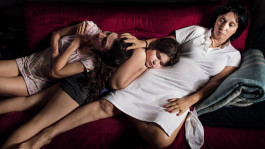
THREE GENERATIONS
Having seen my mother go through midlife and watching my daughter enter womanhood, it's interesting to see how some of it is very similar and some of it is very different. There is more room now for me to decide not to dye my hair, to even do this work. I don't know if this work would get this much attention and support, especially from other women, even three or four years ago. I don't think my mom had different voices and options like I have. What I see with my daughter entering early womanhood is all the gender fluidity. Definitions are really, really different. The approach to being LGBTQ is very, very different. My kids are educating me on some things, but some of it is just the same--those insecurities and going through those teen years, the self-awareness. Some of it is universal and just throws me back to the time when I was her age.
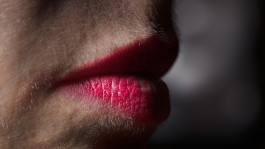
LIP STICK AND FACIAL HAIR
Because my body is the center of my work, I went as deep as I could. People get a close look that makes them relate to the work and ask questions and talk about the issues I want them to talk about. The negative is that many people in the art world look at my work as "a female artist dealing with female issues," in a way that looks down on the work, not appreciating that I'm talking about fifty-one percent of the population. It's not just a little marginal, crazy "female issue" thing. I've never heard it about John Copeland photographing his body or Lucian Freud, who paints his family and close ones. No one said, "Oh, this is a male artist doing male work."
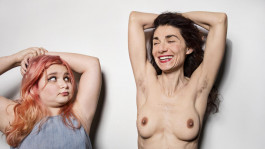
MOM BEING A LITTLE CRAZY
I think I am more patient now. I am more compassionate. I am less judgmental. I am more maternal, even to my students. Those qualities could not have been earned without the loss of beauty, youth, fertility ... I guess. It's hard to know because it's all such a complex process. That's why I think it is easier to be religious, because we think there is some sort of goal to getting older and going through suffering. There is no doubt that it brings some good qualities to our personalities and emotional structure, but if you're religious it makes it more meaningful. If you are not religious, you arrive at the question: What is the meaning of all this? What is the point of gaining the qualities we're gaining, the wisdom, to eventually become very sick and die?
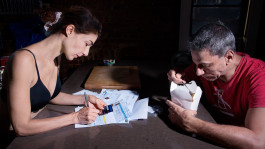
BILLS
My life is just a normal life, and many times I want to pause and experience and feel and understand the moment. This is what I am trying to do with the work. Some moments can be celebrated, even if they are painful. I want to stop and look deeper into what is universal. Many times, looking at other people's lives or talking to other people, I'm inspired to go back into my life and photograph those moments. Sometimes it's in a more aggressive way and sometimes it's in a more seductive way. Whether it's to be a little provocative or to be inviting, I want to look at my life and to help others look at their lives and to feel and accept and understand the joy.
PUBLISHED IN PLAYGIRL MAGAZINE
PHOTOGRAPHY BY ELINOR CARUCCI
view more
FEATURE
Playgirl magazine
mid: being the part in the middle or midst; occupying a middle position
When affixed to the word “life,” this benign prefix takes on crisis connotations, while somehow simultaneously conveying boredom. Midlife lacks the seduction of youth and acumen of old age. It is not here, nor there. Photographer Elinor Carucci’s monograph Midlife upends these interpretations. Neither mundane nor catastrophic, it is an arresting documentary of a universal life stage defined by aging parents, greying hair, growing children, and the conflicting emotions they precipitate. It is also a record of the period’s rewards: an amplified enjoyment of life, stronger connections to family, and feelings of personal liberation and acceptance.
Carucci’s journey to this enlightened place is charted by her greater oeuvre. Her first book, Closer, reveals a young woman reflected in her parents and partner. In her next, Mother, the barometer becomes her burgeoning belly, then babies. Midlife, instead, turns the audit inward, examining vestiges of past identities—lustrous locks turned grey, taut muscles turned slack, passion turned into partnership, toddlers turned teenagers, a uterus removed—to decipher what remains once external qualifiers fall away.
By placing her body at the center of the work, Carucci challenges the notion that middle-aged women are invisible. By commemorating the phase’s common symbols, she rebels against the dismissal of middle age as a transition. In midlife, her images suggest, we become the axis around which younger and older generations orbit, the core that binds the poles together—the middle.
The middle of anything, unscrutinized, is forgettable. Examined, Carucci hypothesizes, it becomes a bellwether: the legacy of our life to date and an astute map for navigating the future.

ERAN & I
We tend to think that what women go through in midlife is more difficult, and it is more difficult to be a middle-aged woman. It is more challenging in some ways, definitely professionally, and appearance is—generally speaking—more important for women. There is also something about the loss of fertility, which is not something men go through. In my case it was a hysterectomy, so it was more extreme, but the loss of fertility irrelevant of age is difficult, not because you want to have another child but because of how you define and see yourself. But then, I’m talking to my friends who are guys and they have their challenges as well, so I don’t know who has it harder. I’m not trying to sugarcoat it, but we should be helping one another. If women can make as much money as men, it can help the men and it can help the marriage and it can help the family.

HAIR DYE
My decision to stop dyeing my hair was my reaction to the Me Too movement. When it started, there was something about it that made me think, "Fuck this: My hair is grey and I don't want to keep hiding it." I hate hiding things. I hate secrets. I think they burden us. This is part of the reason I make the work that I make. There is something very liberating in not having secrets, in sharing your flaws, your weaknesses, and your bad times. And I was feeling like I was hiding my grey hair all the time. There was something in the constant process of dyeing the hair and seeing the roots grow that was driving me crazy. If I could have my 25-year-old hair back, I would do it, but I can't. It was liberating, but it was scary. My son was really disturbed by it, realizing it was there the whole time. I had to deal with the way people around me--from the closest people to the professional world--reacted. There is a reaction. It affects the way people see you. It's a little thing, but it affects your life. It makes you think. It makes you lose some old tribes, but maybe find a new one.

LEAVING
My definition of feminism changes by the day, but I think it's the appreciation of the opportunities and qualities of women. Men and women are similar, but they are not the same. I had a big fight with my daughter a few days ago when I said, generally speaking, on average, women are not as physically strong as men. Physically. Not in terms of what their bodies can do or endure. She was so upset. She called me conservative. It got out of control. Then we saw Michelle Wolf's last stand-up comedy act and this was one of the things she was talking about, and I was like see: She is a feminist saying that we don't have to be the same in order to be appreciated for who we are. I think this is what feminism is to me. It's not seeing men as superior or women as superior. I don't think women are smarter. I don't think they are more sensitive. I don't think men are more capable professionally, or even in the battlefield. I just think that they are in some ways different and in some ways not--and we should be respected, appreciated, and compensated for our qualities. I guess this is feminism. It is so crucial to define feminism, but it is also crucial that it doesn't become man hating and it doesn't alienate half of the population. It is about how we create a world that works better for all of us.

THREE GENERATIONS
Having seen my mother go through midlife and watching my daughter enter womanhood, it's interesting to see how some of it is very similar and some of it is very different. There is more room now for me to decide not to dye my hair, to even do this work. I don't know if this work would get this much attention and support, especially from other women, even three or four years ago. I don't think my mom had different voices and options like I have. What I see with my daughter entering early womanhood is all the gender fluidity. Definitions are really, really different. The approach to being LGBTQ is very, very different. My kids are educating me on some things, but some of it is just the same--those insecurities and going through those teen years, the self-awareness. Some of it is universal and just throws me back to the time when I was her age.

LIP STICK AND FACIAL HAIR
Because my body is the center of my work, I went as deep as I could. People get a close look that makes them relate to the work and ask questions and talk about the issues I want them to talk about. The negative is that many people in the art world look at my work as "a female artist dealing with female issues," in a way that looks down on the work, not appreciating that I'm talking about fifty-one percent of the population. It's not just a little marginal, crazy "female issue" thing. I've never heard it about John Copeland photographing his body or Lucian Freud, who paints his family and close ones. No one said, "Oh, this is a male artist doing male work."

MOM BEING A LITTLE CRAZY
I think I am more patient now. I am more compassionate. I am less judgmental. I am more maternal, even to my students. Those qualities could not have been earned without the loss of beauty, youth, fertility ... I guess. It's hard to know because it's all such a complex process. That's why I think it is easier to be religious, because we think there is some sort of goal to getting older and going through suffering. There is no doubt that it brings some good qualities to our personalities and emotional structure, but if you're religious it makes it more meaningful. If you are not religious, you arrive at the question: What is the meaning of all this? What is the point of gaining the qualities we're gaining, the wisdom, to eventually become very sick and die?

BILLS
My life is just a normal life, and many times I want to pause and experience and feel and understand the moment. This is what I am trying to do with the work. Some moments can be celebrated, even if they are painful. I want to stop and look deeper into what is universal. Many times, looking at other people's lives or talking to other people, I'm inspired to go back into my life and photograph those moments. Sometimes it's in a more aggressive way and sometimes it's in a more seductive way. Whether it's to be a little provocative or to be inviting, I want to look at my life and to help others look at their lives and to feel and accept and understand the joy.
PUBLISHED IN PLAYGIRL MAGAZINE
PHOTOGRAPHY BY ELINOR CARUCCI
view more